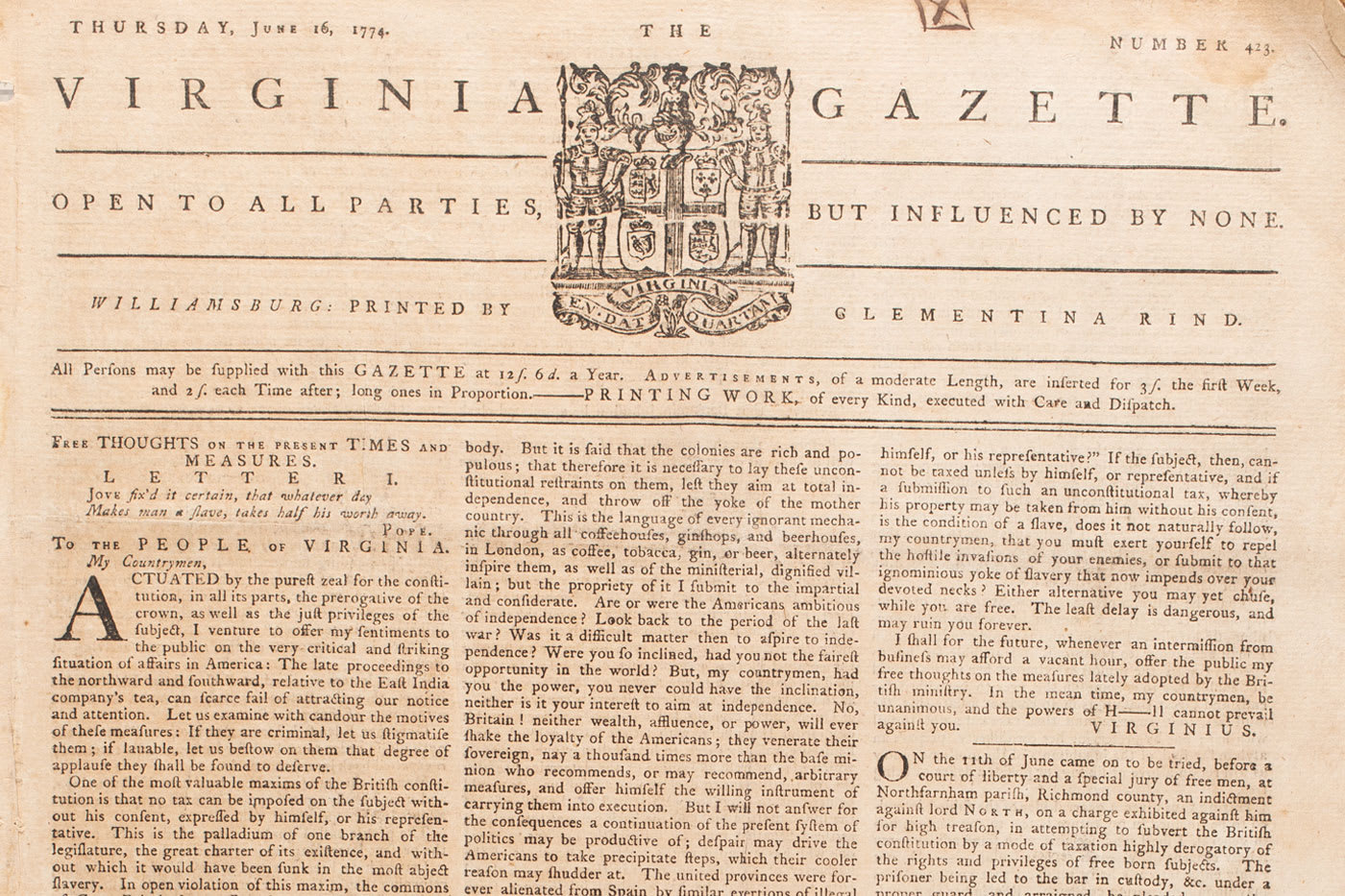Letter writers to newspapers in early America found an important platform to influence opinions. When Clementina Rind took over her husband’s Williamsburg printing business after he died in August 1773, she printed government documents and material from other newspapers. And like other publishers of the day, she chose to print letters.
The letters in Rind’s Virginia Gazette were generally sympathetic to the patriot cause. Examples can be found in three issues that were recently added to the collection at Colonial Williamsburg’s John D. Rockefeller Jr. Library.
“The Virginia Gazette is an invaluable tool for researching and teaching history here at Colonial Williamsburg,” Associate Librarian Doug Mayo said.
“Tenacious of their Liberty”
The June 2, 1774, issue includes a letter from “Raleigh,” who describes himself as having lived some years in America. Raleigh’s was an open letter to Lord North, the British prime minister. A year and a half before the Boston Tea Party, Raleigh implored North to repeal duties on tea “to prevent perhaps the total defection of the colonies.”
Of the colonists in general, Raleigh wrote: “They are a polite, well improved people, justly tenacious of their liberty, and thoroughly sensible of its value. From the cradle they are taught to boast their privilege, nor will they ever patiently endure the yoke of oppression.”
In words that call to mind the colonists’ famous cry of no taxation without representation, Raleigh wrote: “Is it possible an English parliament, even if the members of which it is composed were wholly disinterested, should know properly how to levy contributions on a country at so great a distance, and with which they are in general so little acquainted? Have not the Americans representatives of their own?...Why then will you not grant them the privilege...of raising their money in a mode they most approve?”
When events occurred in Williamsburg, Rind reported on them herself. In the same June 2 issue, she offered details on a day of “fasting, humiliation, and prayer” in support of Bostonians whose port the British had closed: “It is with pleasure we assure our readers that every inhabitant of this city, and numbers from the country, testified their gratitude, in the most expressive manner, by attending the worthy and patriotic SPEAKER at the courthouse, and proceeding from thence, with the utmost decency and decorum, to the church, where prayers were accordingly read, and a sermon, suitable to the important occasion, was delivered.”
“A Ministerial Snare”
The June 16, 1774, issue featured a letter from “Virginius,” who reiterated the injustice of taxation without representation: “One of the most valuable maxims of the British constitution is that no tax can be imposed on the subject without his consent, expressed by himself, or his representative. This is the palladium of one branch of the legislature, the great charter of its existence, and without which it would have been sunk in the most abject slavery. In open violation of this maxim, the commons of Great Britain have assumed the right of giving and granting away the property of others. They have denied us a right; a right which they themselves immemorially have most tenaciously adhered to.”
The same issue included a letter from a “British American,” who was living in Virginia, though at a “great distance from Williamsburg.” The British American was less strident than Virginius. Despite “the present alarming state of affairs,” he urged his fellow Virginians not to act rashly and to “be careful that your honest indignation against the two houses of the British parliament does not hurry you into any discreet expressions against, or corrupt your loyalty to, your sovereign.”
Concluded the British American: “Wait therefore with patience, my fellow citizens, a few weeks longer.”
Rind liked to include poetry in her Gazette, and the June 16 issue included verses “written by a LADY, on receiving a handsome set of TEA CHINA” that take the tea taxers to task:
Still, alas! thou might’st have been
Chiefest fav’rite of the fair;
Now thou art with horror seen
As a ministerial snare.
“Cordially Unite”
By the July 14, 1774, issue (the third of Clementina Rind’s Virginia Gazettes recently acquired by the Rockefeller Library), the British American was losing patience.
“Be not deceived,” he wrote, “by imagining that the submission of Boston...is the ultimate end of the British aristocracy. No, it is only a part of the general plan they have formed for enslaving all America, by attacking each colony singly; for as every colony have refused to submit to the duty imposed upon tea, they will all, one after another, feel the resentment of, and be called upon for, the same submission to parliament, if you do not cordially unite in supporting the first sufferer.”
---
Through the generosity of donors, the John D. Rockefeller Jr. Library has added more than 100 issues of the Virginia Gazette to its collection, bringing the total number of the newspaper to more than 500. Approximately 2,500 issues were printed in Williamsburg during the 18th century.
